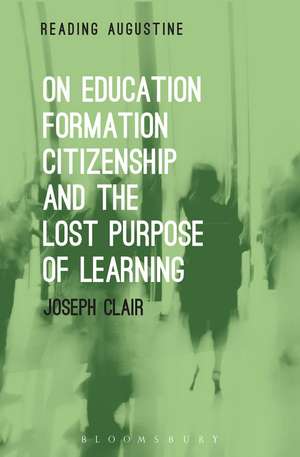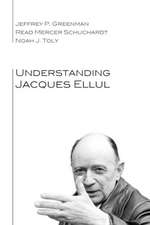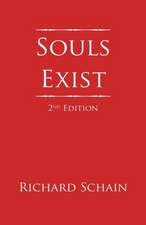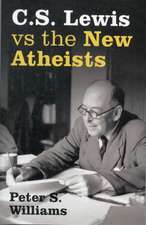On Education, Formation, Citizenship and the Lost Purpose of Learning: Reading Augustine
Autor Professor Joseph Clairen Limba Engleză Hardback – 29 noi 2017
| Toate formatele și edițiile | Preț | Express |
|---|---|---|
| Paperback (1) | 156.87 lei 6-8 săpt. | |
| Bloomsbury Publishing – 29 noi 2017 | 156.87 lei 6-8 săpt. | |
| Hardback (1) | 494.45 lei 6-8 săpt. | |
| Bloomsbury Publishing – 29 noi 2017 | 494.45 lei 6-8 săpt. |
Din seria Reading Augustine
- 15%
 Preț: 162.36 lei
Preț: 162.36 lei - 9%
 Preț: 150.96 lei
Preț: 150.96 lei - 14%
 Preț: 177.05 lei
Preț: 177.05 lei - 8%
 Preț: 157.75 lei
Preț: 157.75 lei - 13%
 Preț: 174.51 lei
Preț: 174.51 lei - 8%
 Preț: 151.38 lei
Preț: 151.38 lei - 8%
 Preț: 151.38 lei
Preț: 151.38 lei - 15%
 Preț: 175.53 lei
Preț: 175.53 lei - 8%
 Preț: 158.64 lei
Preț: 158.64 lei - 19%
 Preț: 169.08 lei
Preț: 169.08 lei - 14%
 Preț: 177.05 lei
Preț: 177.05 lei - 14%
 Preț: 176.44 lei
Preț: 176.44 lei - 15%
 Preț: 168.74 lei
Preț: 168.74 lei - 14%
 Preț: 176.17 lei
Preț: 176.17 lei - 19%
 Preț: 152.28 lei
Preț: 152.28 lei - 14%
 Preț: 171.22 lei
Preț: 171.22 lei - 44%
 Preț: 118.11 lei
Preț: 118.11 lei - 23%
 Preț: 171.85 lei
Preț: 171.85 lei - 13%
 Preț: 174.51 lei
Preț: 174.51 lei - 9%
 Preț: 157.32 lei
Preț: 157.32 lei - 8%
 Preț: 151.38 lei
Preț: 151.38 lei - 14%
 Preț: 170.50 lei
Preț: 170.50 lei - 15%
 Preț: 156.87 lei
Preț: 156.87 lei - 9%
 Preț: 150.50 lei
Preț: 150.50 lei - 15%
 Preț: 157.32 lei
Preț: 157.32 lei - 14%
 Preț: 163.91 lei
Preț: 163.91 lei - 8%
 Preț: 158.20 lei
Preț: 158.20 lei
Preț: 494.45 lei
Preț vechi: 654.98 lei
-25% Nou
Puncte Express: 742
Preț estimativ în valută:
94.61€ • 98.59$ • 78.34£
94.61€ • 98.59$ • 78.34£
Carte tipărită la comandă
Livrare economică 03-17 aprilie
Preluare comenzi: 021 569.72.76
Specificații
ISBN-13: 9781501326158
ISBN-10: 1501326155
Pagini: 142
Dimensiuni: 140 x 216 mm
Greutate: 0.31 kg
Ediția:HPOD
Editura: Bloomsbury Publishing
Colecția Bloomsbury Academic
Seria Reading Augustine
Locul publicării:New York, United States
ISBN-10: 1501326155
Pagini: 142
Dimensiuni: 140 x 216 mm
Greutate: 0.31 kg
Ediția:HPOD
Editura: Bloomsbury Publishing
Colecția Bloomsbury Academic
Seria Reading Augustine
Locul publicării:New York, United States
Caracteristici
Applies Augustine's views on reading to the modern liberal arts program, arguing for the continued relevance of mindful reading for both educational and personal development
Notă biografică
Joseph Clair is Director of the William Penn Honors Program and Assistant Professor of Religious Studies at George Fox University, USA. He is the author of Discerning the Good in the Letters and Sermons of Augustine (2016).
Cuprins
List of Abbreviations1. The Lost Purpose of Learning2. Education and the Order of Love3. The Art of Reading4. Citizenship5. A Way ForwardBibliographyIndex
Recenzii
On Education is a compelling read. It brings fresh air to Augustine's remarkable life. In just 120 pages, with Augustine as his guide, Clair diagnoses the disarray that afflicts the modern university, making a case for liberal education grounded in moral and spiritual purposes.
As a foray toward the calling of reading deeply as a facet of an intellectual asceticism and a serious option for those concerned about higher education, I commend Clair's book.
This book should be compulsory reading for members of the board at Christian universities. The book is also a challenging invitation to all Augustinian scholars to search across a spectrum of fields for how the life and work of Augustine could be fruitful for contemporary society.
Some books are long, but relative to their length you don't benefit much. Some books are short, but relative to their length you benefit greatly. Joseph Clair's new book, On Education, Formation, Citizenship and the Lost Purpose of Learning fits in the latter category. In 120 pages Clair gives a crisp and thoughtful account of how higher education has lost its moral rudder.
Joseph Clair compellingly responds to the current milieu in which higher education has largely lost its moral and spiritual moorings. By reappropriating Augustine's legacy, he shows us how higher education can shift from an emphasis on self-fulfillment to an emphasis on knowing God, civic responsibility, and loving others. This book will have a profound impact on anyone who cares about higher education today; it should be required reading for anyone who wants to help institutions develop a stronger mission, culture, and approach to student learning.
The power of Augustine's biography and rhetoric can obscure how he transformed learning and reading into a way of life for an age uncertain of its cultural ideals and tempted by despair. In this graceful book-rooted in ancient wisdom yet without nostalgia-Joseph Clair revives this influential Augustinian legacy in the service of a dynamic vision of liberal arts education that is both aspirational and practical for our critical moment.
The university as we know it is a tin-man: a machine without a heart that churns out students in its image. In this provocative book, Joseph Clair shows a way to renew the university by giving it a heart-and a soul. He does so by taking us to one of the West's most important products and proponents of the liberal arts: Augustine. The result is a refreshing take on our contemporary challenge.
Clair offers a perceptive and, as far as I know, new defense of a Christian great books education that is an excellent contribution to our reflection on contemporary liberal education.
As a foray toward the calling of reading deeply as a facet of an intellectual asceticism and a serious option for those concerned about higher education, I commend Clair's book.
This book should be compulsory reading for members of the board at Christian universities. The book is also a challenging invitation to all Augustinian scholars to search across a spectrum of fields for how the life and work of Augustine could be fruitful for contemporary society.
Some books are long, but relative to their length you don't benefit much. Some books are short, but relative to their length you benefit greatly. Joseph Clair's new book, On Education, Formation, Citizenship and the Lost Purpose of Learning fits in the latter category. In 120 pages Clair gives a crisp and thoughtful account of how higher education has lost its moral rudder.
Joseph Clair compellingly responds to the current milieu in which higher education has largely lost its moral and spiritual moorings. By reappropriating Augustine's legacy, he shows us how higher education can shift from an emphasis on self-fulfillment to an emphasis on knowing God, civic responsibility, and loving others. This book will have a profound impact on anyone who cares about higher education today; it should be required reading for anyone who wants to help institutions develop a stronger mission, culture, and approach to student learning.
The power of Augustine's biography and rhetoric can obscure how he transformed learning and reading into a way of life for an age uncertain of its cultural ideals and tempted by despair. In this graceful book-rooted in ancient wisdom yet without nostalgia-Joseph Clair revives this influential Augustinian legacy in the service of a dynamic vision of liberal arts education that is both aspirational and practical for our critical moment.
The university as we know it is a tin-man: a machine without a heart that churns out students in its image. In this provocative book, Joseph Clair shows a way to renew the university by giving it a heart-and a soul. He does so by taking us to one of the West's most important products and proponents of the liberal arts: Augustine. The result is a refreshing take on our contemporary challenge.
Clair offers a perceptive and, as far as I know, new defense of a Christian great books education that is an excellent contribution to our reflection on contemporary liberal education.













